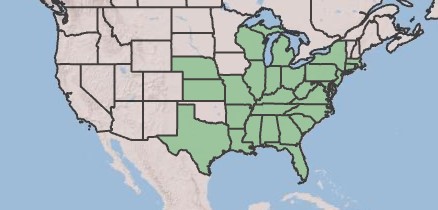Difference between revisions of "Yucca filamentosa"
(→Habitat) |
ParkerRoth (talk | contribs) (→Description) |
||
| Line 22: | Line 22: | ||
==Description== | ==Description== | ||
<!-- Basic life history facts such as annual/perennial, monoecious/dioecious, root morphology, seed type, etc. --> | <!-- Basic life history facts such as annual/perennial, monoecious/dioecious, root morphology, seed type, etc. --> | ||
| + | |||
| + | According to Diaz-Torbio and Putz (2021), ''Yucca filamentosa'' has taproots with a below-ground to above-ground biomass ratio of 9.05 and nonstructural carbohydrate concentration of 58.1 mg g<sup>-1</sup>.<ref>Diaz‐Toribio, M. H. and F. E. Putz. 2021. Underground carbohydrate stores and storage organs in fire‐maintained longleaf pine savannas in Florida, USA. American Journal of Botany 108(3):432-442.</ref> | ||
==Distribution== | ==Distribution== | ||
Latest revision as of 15:11, 3 July 2024
| Yucca filamentosa | |
|---|---|
| Scientific classification | |
| Kingdom: | Plantae |
| Division: | Magnoliophyta - Flowering plants |
| Class: | Liliopsida - Monocotyledons |
| Order: | Liliales |
| Family: | Agavaceae |
| Genus: | Yucca |
| Species: | Y. filamentosa |
| Binomial name | |
| Yucca filamentosa L. | |

| |
| Natural range of Yucca filamentosa from USDA NRCS Plants Database. | |
Common name: Adam's needle, spoonleaf Yucca, curlyleaf Yucca
Contents
Taxonomic Notes
Synonyms:
Description
According to Diaz-Torbio and Putz (2021), Yucca filamentosa has taproots with a below-ground to above-ground biomass ratio of 9.05 and nonstructural carbohydrate concentration of 58.1 mg g-1.[1]
Distribution
Ecology
Habitat
Y. filamentosa occurs in environments such as sand ridges, thickets, dunes, sand pine-sand live oak scrubs, and open pine woods. It also grows in areas prone to human disturbance such as slash pine plantations, roadsides, old fields, and forest margins. Y. filamentosa will usually be found in open areas with sandy soils.[2]
Conservation, cultivation, and restoration
Cultural use
Photo Gallery
References and notes
- ↑ Diaz‐Toribio, M. H. and F. E. Putz. 2021. Underground carbohydrate stores and storage organs in fire‐maintained longleaf pine savannas in Florida, USA. American Journal of Botany 108(3):432-442.
- ↑ Florida State University Robert K. Godfrey Herbarium database. URL: http://herbarium.bio.fsu.edu. Last accessed: June 2023. Collectors: Loran C. Anderson, Billy Boothe, Robert K. Godfrey, K. MacClendon, and Travis MacClendon. States and counties: Alabama: Madison. Florida: Calhoun, Bay, Gadsden, Jackson, Franklin, Liberty, Madison, Taylor, Volusia, and Washington. North Carolina: Brunswick.